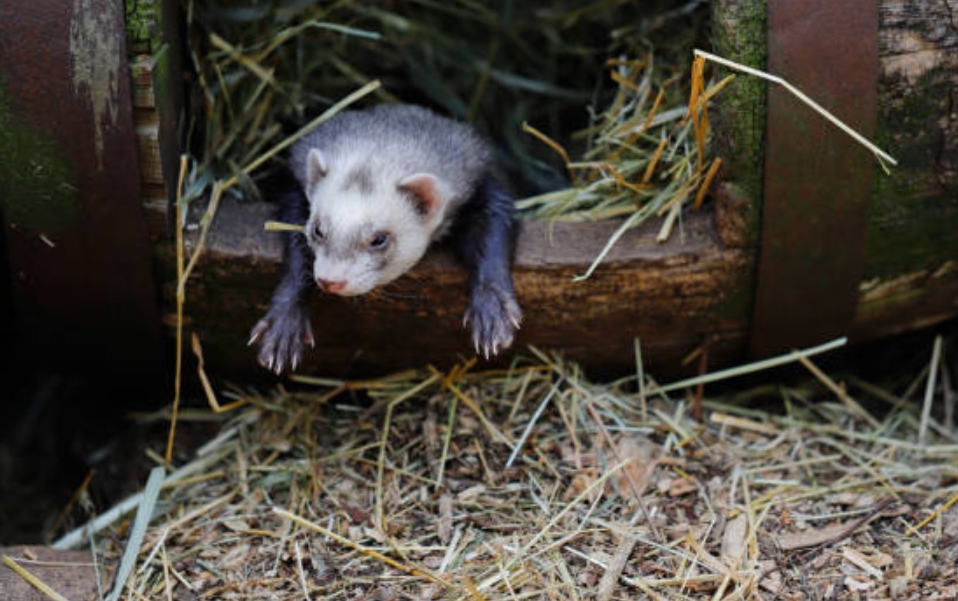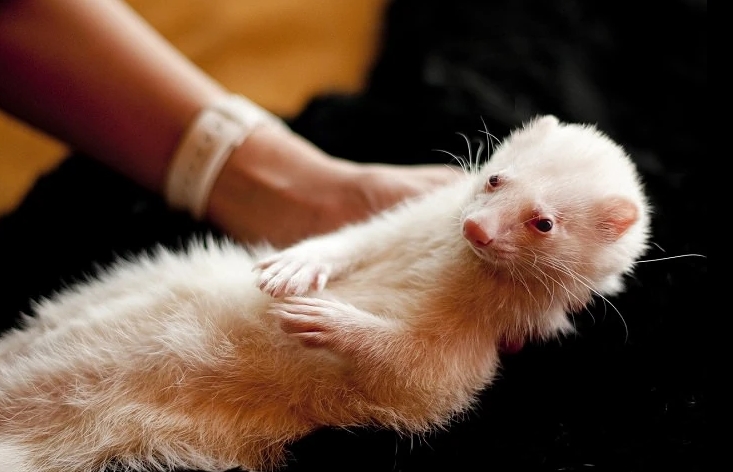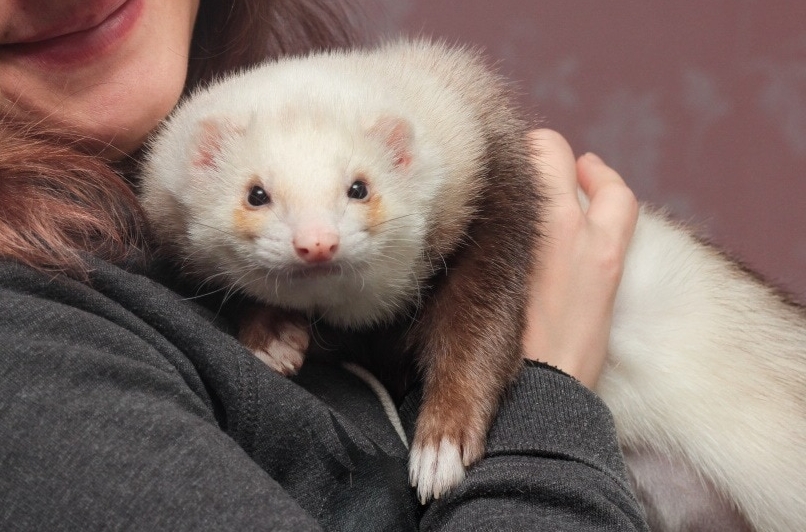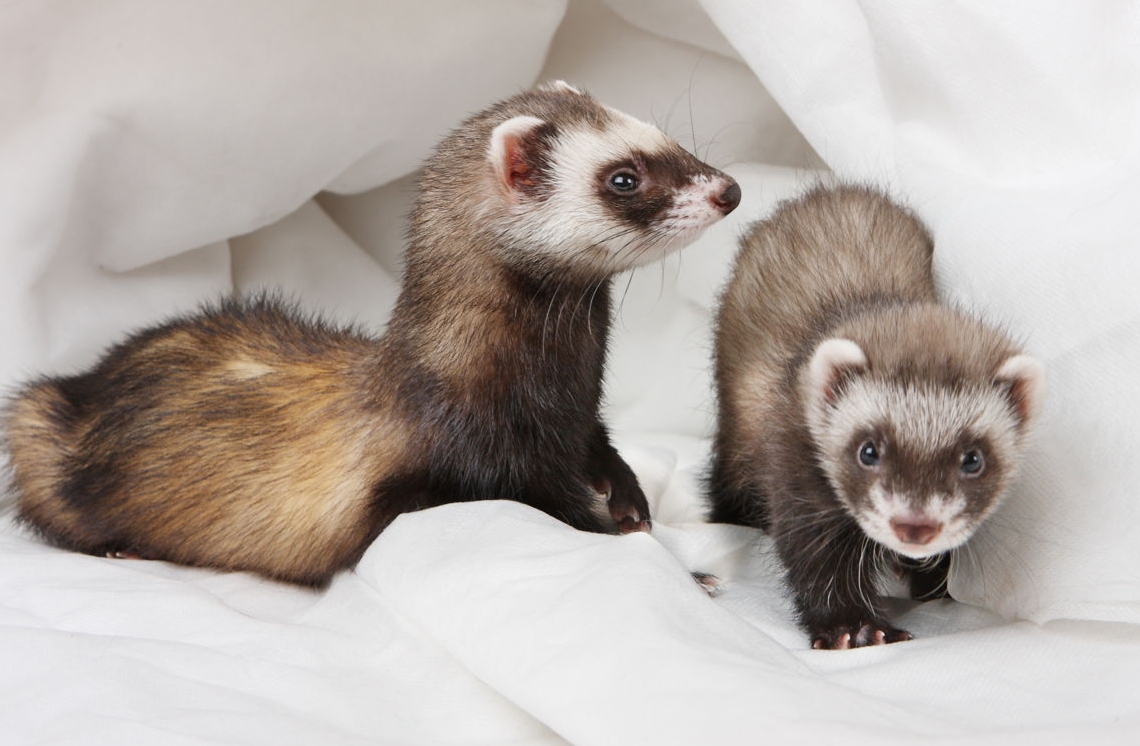Ferrets are lovable and playful pets, but they come with a distinctive musky odor that can be off-putting to some owners. It is a very common question Why Do Ferrets Stink? The odor is caused by their scent glands, which release a musk that helps ferrets communicate with each other. However, with proper care and hygiene, ferret odor can be controlled. In this blog post, we will discuss effective odor-free management practices for ferrets. By following these tips, you can minimize your ferret’s odor and create a more pleasant living environment for both you and your pet.
Why Do Ferrets Stink?

Ferrets have a distinct odor that comes from their scent glands. These glands produce a musk that helps ferrets communicate with each other and mark their territory. While some people may find the odor unpleasant, it is a natural part of a ferret’s biology. However, with proper care and hygiene, the odor can be controlled.
For example, regular cage cleaning and maintenance is an important part of odor-free management for ferrets. This includes cleaning out the litter box daily, washing food and water bowls regularly, and wiping down the cage with a mild, unscented cleaner. Bathing your ferret every few months can also help reduce their odor, but it’s important not to over-bathe them as this can strip their skin of natural oils and make the odor worse. By taking these simple steps, you can minimize your ferret’s odor and enjoy a cleaner, more pleasant living environment.
I. What is Effective Odor-Free Management for Ferrets?
Ferrets are known for their unique odor, which can be quite strong. However, with proper care and attention, you can manage ferret odor effectively. To keep your ferret’s living area odor-free, it is essential to clean its cage or enclosure regularly. Use odor-absorbing bedding and ensure adequate ventilation in their living space. Additionally, it is important to bathe your ferret with specialized shampoo to keep its coat clean and fresh. Finally, make sure to provide your ferret with a healthy diet and plenty of clean water, as dehydration can worsen its odor.
Why do ferrets have a distinct odor?
Ferrets have a distinct odor due to their scent glands, which are located near their anus. These glands produce a musky secretion that helps ferrets communicate with each other and mark their territory. The musk is made up of a complex mixture of chemicals, including proteins and lipids, that are unique to each ferret. While the odor may be off-putting to some people, it is a natural part of a ferret’s biology and is not necessarily a sign of poor hygiene. However, with proper care and odor-free management practices, the odor can be minimized so that you and your ferret can enjoy a cleaner, more pleasant living environment.
Top 5 Common Health-Related Questions About dogs: Every Dog Owner Needs to Know
The importance of proper care and hygiene for odor control
Proper care and hygiene are essential for controlling the odor of ferrets. This includes regular cleaning of their cages, litter boxes, and food and water bowls. Ferrets should also be given a healthy diet and plenty of clean water. It’s important to bathe your ferret every few months, but not too frequently as this can strip their skin of natural oils and make the odor worse. Regular grooming can also help control odor by removing loose hair and dirt.
For example, keeping your ferret’s living environment clean and well-ventilated is crucial for odor-free management. Ferrets are sensitive to their environment and can become stressed or sick if they are kept in dirty or cramped conditions. A clean and spacious cage with appropriate bedding will not only help control odor, but it will also promote your ferret’s overall health and well-being. By providing your ferret with proper care and hygiene, you can minimize its odor and enjoy a happy and healthy pet.
II. Understanding Ferret Odor

Understanding ferret odor is the first step in managing it effectively. Ferrets have scent glands that release a musky odor as a natural part of their biology. This odor can be intensified by poor hygiene, diet, or living conditions. Overbathing or using scented cleaning products can also make the odor worse. However, with proper care and hygiene, the odor can be minimized so that you and your ferret can enjoy a cleaner, more pleasant living environment. It’s important to remember that while the odor may be off-putting to some people, it is a natural part of a ferret’s biology and does not necessarily indicate poor hygiene. By understanding the causes of ferret odor and implementing effective odor-free management practices, you can create a happy and healthy home for you and your pet.
The role of scent glands in ferrets
Ferrets have scent glands located near their anus that produce a musky odor as a natural part of their biology. These glands are important for communication and marking territory among ferrets. The odor produced by these glands can be intensified by poor hygiene, diet, or living conditions. Some ferrets may have a stronger odor than others due to genetics or health issues. However, with proper care and hygiene, the odor can be managed effectively.
For example, regular cleaning of the ferret’s living space, such as their cage, litter box, and food and water bowls, is important for controlling the odor from their scent glands. Ensuring that your ferret has a healthy diet and access to clean water can also help manage their odor. Additionally, providing your ferret with appropriate bedding and living conditions, such as a well-ventilated and spacious cage, can promote their overall health and well-being and help control their odor. By understanding the role of scent glands in ferrets and implementing effective odor-free management practices, you can create a cleaner, more pleasant living environment for you and your pet.
The chemical makeup of ferret musk
Ferret musk is a complex mixture of chemicals produced by the scent glands located near the anus. The composition of ferret musk can vary from one ferret to another and is unique to each individual. Ferret musk contains a combination of proteins and lipids that give it its distinctive musky odor. These chemicals are important for communication and marking territory among ferrets. While the odor may be off-putting to some people, it is a natural part of a ferret’s biology and does not necessarily indicate poor hygiene.
For example, some ferret owners may choose to use products to mask or eliminate the odor of ferret musk. However, it’s important to use caution when selecting products as some may contain chemicals that can be harmful to ferrets. Instead, focusing on proper care and hygiene, such as regular cleaning of their living space and providing a healthy diet and clean water, can be more effective for managing ferret odor. By understanding the chemical makeup of ferret musk and implementing effective odor-free management practices, you can create a happy and healthy home for you and your pet.
How diet and environment can affect ferret odor
The diet and environment of a ferret can play a significant role in the intensity of its musky odor. A diet high in fat or protein can contribute to stronger odor from their scent glands. Additionally, living in dirty or cramped conditions can also intensify the smell of ferret musk. It’s important to ensure that your ferret has a healthy and balanced diet and access to clean living conditions to help manage their odor.
For example, feeding your ferret a high-quality, protein-rich diet can provide them with the necessary nutrients while also reducing the intensity of its musky odor. Additionally, providing your ferret with a spacious and well-ventilated living area can help promote its overall health and well-being, and reduce the intensity of its musky odor. Regular cleanings of their living space, such as their cage, litter box, and food and water bowls, are also essential for controlling their odor. By understanding how diet and environment can affect ferret odor and implementing effective odor-free management practices, you can create a cleaner and more pleasant living environment for you and your pet.
III. Managing Ferret Odor: Best Practices

Effective odor-free management for ferrets involves a combination of proper care and hygiene, understanding the role of scent glands and the chemical makeup of ferret musk, and addressing diet and living conditions that can affect ferret odor. Regular cleaning of their living space, providing a healthy diet and clean water, and promoting their overall health and well-being can help manage the intensity of their musky odor. It’s important to remember that ferret odor is a natural part of their biology and cannot be completely eliminated, but with proper care and attention, it can be controlled and minimized for a cleaner and more pleasant living environment.
Regular cage cleaning and maintenance
Regular cleaning and maintenance of your ferret’s cage are essential for effective odor-free management. Ferrets are active animals that require a clean and spacious living environment to thrive. Failure to clean their cage regularly can lead to the buildup of waste and odor, which can be harmful to their health and contribute to the intensity of their musky odor.
For example, cleaning their cage at least once a week, or more often if needed, can help prevent the buildup of waste and odor. This includes removing any soiled bedding, litter, or food and water dishes, wiping down the interior of the cage with a safe and gentle cleaning solution, and replacing it with fresh bedding and litter. Additionally, providing a well-ventilated living space can also help reduce the intensity of their musky odor. By regularly maintaining their living space and promoting a healthy and clean environment, you can help manage the intensity of their musky odor and promote their overall health and well-being.
Bathing ferrets properly
Bathing your ferret can be an effective way to manage its odor, but it’s important to do so properly to avoid damaging its skin and coat. Ferrets have sensitive skin that can easily become dry or irritated with too frequent bathing, so it’s recommended to bathe them no more than once a month. Additionally, using a gentle and ferret-safe shampoo is essential to avoid causing skin irritation and other health problems.
For example, to bathe your ferret properly, fill a sink or bathtub with warm water and add a small amount of ferret-safe shampoo. Gently massage the shampoo into their coat, avoiding their eyes, nose, and ears. Rinse thoroughly with clean water and towel dry, making sure to avoid leaving them wet and cold. Additionally, providing them with a warm and comfortable living space after their bath can help promote their overall health and well-being. By properly bathing your ferret and using gentle and safe products, you can help manage their odor and promote their skin and coat health.
Using odor-neutralizing products
Using odor-neutralizing products can be a helpful addition to your odor-free management routine for your ferret. These products work by neutralizing the odor-causing compounds in your ferret’s musk, rather than simply masking the odor with a strong fragrance. However, it’s important to use products that are safe for ferrets and won’t cause harm to their health or skin.
For example, several types of odor-neutralizing products can be used in your ferret’s living space, such as sprays, wipes, and powders. These products typically contain natural ingredients like baking soda or enzymes that help break down the odor-causing compounds in your ferret’s musk. It’s important to follow the instructions carefully and use these products sparingly, as overuse can be harmful to your ferret’s health. Additionally, it’s important to choose products that are specifically designed for use with ferrets, as some products may contain harmful chemicals or fragrances that can be toxic to them.
Managing litter box odors
Managing litter box odors is an important part of effective odor-free management for your ferret. Ferrets are known for their strong-smelling musk, and their litter boxes can quickly become a source of unpleasant odors if not properly maintained. Regular cleaning and maintenance of the litter box is key to controlling these odors.
For example, it’s recommended to scoop your ferret’s litter box at least once a day and completely change the litter every 2-3 days. Using high-quality litter that is designed to absorb odors can also help control the smell. Additionally, placing the litter box in a well-ventilated area can help reduce odors by allowing air to circulate and dissipate the smell. By regularly cleaning and maintaining your ferret’s litter box, you can effectively manage their odor and promote their overall health and well-being.
IV. Diet and Ferret Odor

The impact of diet on ferret odor cannot be overstated. A ferret’s diet plays a significant role in managing its musky scent and overall health. By providing your ferret with a healthy, balanced diet that meets its specific nutritional needs, you can effectively manage its odor and promote its well-being.
The role of diet in ferret odor
Diet plays a significant role in managing ferret odor. Feeding your ferret a healthy, balanced diet can help reduce the intensity of their musk and improve their overall health. Ferrets are obligate carnivores, meaning that they require a diet that is high in animal-based protein and fat, and low in carbohydrates. Feeding your ferret a diet that is high in carbohydrates or plant-based protein can lead to digestive issues and increased musk production.
For example, a diet that is high in fat and protein, and low in carbohydrates can help reduce the intensity of your ferret’s musk. This type of diet also promotes healthy digestion and can reduce the frequency of litter box odors. It’s important to choose high-quality ferret food that is specifically formulated for their nutritional needs, rather than relying on human food or low-quality pet food. By providing your ferret with a healthy, balanced diet, you can help manage its odor and promote its overall health and well-being.
How to choose the right food for your ferret
Choosing the right food for your ferret is crucial in managing its musky scent and promoting its overall health. Ferrets have specific nutritional needs that require a diet high in animal-based protein and fat, and low in carbohydrates. When choosing a ferret food, look for a brand that is specifically formulated for their nutritional needs and does not contain fillers or unnecessary ingredients.
For example, a high-quality ferret food should list meat or meat meal as the first ingredient, rather than corn or wheat. It should also contain a balance of protein, fat, and fiber to support healthy digestion and reduce litter box odor. Avoid feeding your ferret human food or low-quality pet food, as these can cause digestive issues and increase musk production. With a little research and careful consideration, you can choose a high-quality ferret food that meets your ferret’s nutritional needs and helps manage their odor.
The benefits of raw feeding for odor control
Raw feeding is an increasingly popular approach to feeding ferrets that can also help control their musky odor. A raw diet consists of uncooked meat, bones, and organs, and mimics the natural diet of ferrets in the wild. By providing a diet that is high in protein and low in carbohydrates, raw feeding can help reduce the amount of musk produced by your ferret.
In addition to odor control, raw feeding has other benefits for ferret health. Raw meat provides a natural source of taurine, an amino acid that is essential for ferret health and can improve digestion and reduce the risk of certain health issues. However, it’s important to note that raw feeding requires careful preparation and research to ensure that your ferret is receiving a balanced and safe diet. It’s best to consult with a veterinarian or experienced raw feeder before starting your ferret on a raw diet.
V. Ferret-Proofing Your Home
Ferret-proofing your home is an important aspect of odor-free management for your furry friend. Ferrets are curious and adventurous animals that love to explore their surroundings. However, their natural curiosity can lead them into dangerous situations or cause damage to your home. By taking steps to ferret-proof your living space, you can create a safe and secure environment for your ferret while also minimizing odor and mess.
The importance of ferret-proofing
Ferret-proofing your home is essential to ensure the safety and well-being of your furry friend. Ferrets are notorious escape artists and can easily slip through small spaces or climb to high places. They are also known for chewing on wires, furniture, and other household items, which can pose a danger to both the ferret and your home. By taking the necessary precautions, you can prevent accidents and damage, while also reducing ferret odor and mess.
For example, you can start by blocking off any small spaces or gaps in your home that your ferret can escape or get stuck in. This may include covering vents or blocking off crawl spaces. You should also consider using cord covers or wire looms to protect electrical wires and cables from your ferret’s curious teeth. Additionally, it’s important to secure any loose items in your home, such as books or knick-knacks, that your ferret may knock over or chew on.
Tips for blocking off small spaces
Ferrets are known to be very curious and agile creatures. They love exploring and squeezing into tight spaces, which can be dangerous for them if those spaces are not secure. Ferret-proofing your home is an essential step to prevent any harm to your ferret, but it can also help control its odor. When ferrets feel safe and secure, they tend to be less stressed, which can lead to less odor.
for Example, To prevent your ferret from entering small spaces, you can use baby gates, plexiglass, or cardboard to block off areas such as under couches or behind cabinets. Make sure to check for any gaps or holes that your ferret can squeeze through. Also, keep in mind that ferrets are natural diggers, so it’s important to cover any areas with dirt or carpet that they can dig into. By taking these steps, you can create a safe and secure environment for your ferret while also helping control its odor.
Securing electrical cords and other hazards
Securing electrical cords and other potential hazards is essential in ferret-proofing your home. Ferrets love to explore and play, and they can easily chew on cords or get tangled up in them, causing injury or even death. It’s important to make sure all electrical cords are out of reach or covered with protective tubing. Other potential hazards, such as toxic plants, sharp objects, and small objects that can be swallowed, should also be secured or removed from the ferret’s reach.
For Example, To secure electrical cords, try wrapping them in protective tubing or using cord covers. You can also elevate cords using cord clips or ties to keep them out of reach. For other potential hazards, like toxic plants, remove them from the ferret’s play area and replace them with safe, non-toxic plants. Sharp objects and small objects should be stored in cabinets or drawers that are inaccessible to your ferret. It’s important to regularly check your home for new hazards and take the necessary steps to secure them to keep your ferret safe and odor-free.
Choosing the right flooring for easy clean-up
Ferrets are known for their playful nature and love to run around, dig and explore. However, this can also lead to accidents and messes, resulting in unpleasant odors in your home. One effective way to manage ferret odor is by choosing the right flooring.
When it comes to flooring, the best option for ferret owners is hard flooring such as tiles or hardwood. These types of floors are easy to clean and can withstand scratches and stains caused by ferrets. On the other hand, carpets and rugs can be difficult to clean and can retain odors, making it hard to get rid of the smell. Additionally, carpets and rugs can also be a breeding ground for fleas and mites, which can lead to health problems for your ferret.
If you do choose to use carpets or rugs, it is important to vacuum them regularly and use a high-quality carpet cleaner to remove any stains or odors. It is also recommended to place a washable mat or rug in areas where your ferret spends most of their time protecting the carpet or rug underneath. By choosing the right flooring, you can make it easier to keep your home clean and odor-free while still allowing your ferret to play and explore.
VI. Common Mistakes to Avoid
Keeping ferrets odor-free requires a combination of proper care, hygiene, and attention to their environment. While there are many effective strategies for managing ferret odor, there are also some common mistakes that ferret owners should avoid. By understanding these mistakes and taking steps to prevent them, you can keep your ferrets healthy and odor-free.
In the following sections, we’ll explore some of the most common mistakes that ferret owners make when managing odor, and provide tips on how to avoid them. With the right approach, you can keep your ferrets happy, healthy, and odor-free.
Using scented cleaning products for ferrets
Using scented cleaning products is a common mistake that many ferret owners make when trying to manage odor. Scented products, such as candles, air fresheners, and cleaning sprays, can actually make the odor worse by mixing with the ferret musk and creating a more potent smell. Additionally, scented products can be harmful to your ferret’s health, as they can contain toxic chemicals that your ferret may ingest through grooming or inhaling.
Instead of using scented cleaning products, opt for unscented or odor-neutralizing ones. You can use products specifically designed for ferret odor control, or simply stick to mild, unscented cleaning solutions like vinegar and water. It’s also important to thoroughly rinse any cleaning products off of surfaces that your ferret may come into contact with, such as their cage or litter box. By avoiding scented products and using gentle, odor-neutralizing cleaners, you can help keep your ferret’s environment clean and safe.
Over-bathing ferrets

Overbathing your ferret can make its odor worse. Ferrets have oil glands in their skin that help to keep their coats healthy and shiny. Overbathing can strip their skin of natural oils and cause it to produce more oil to compensate. This can lead to an even stronger musky odor. Additionally, frequent bathing can dry out your ferret’s skin and irritate it.
It is recommended to bathe your ferret no more than once a month, and less frequently if possible. You can also use dry shampoo made specifically for ferrets to help keep them clean and odor-free in between baths. Regular cleaning of their cage and litter box, as well as proper diet and hygiene, can also help control ferret odor.
Not cleaning cages often enough
Not cleaning ferret cages often enough can contribute to a buildup of odors. Ferrets are known to be messy animals, and their cages can quickly become dirty if not cleaned regularly. It’s important to clean the cage at least once a week and spot-clean any soiled areas as needed. This will help prevent a buildup of waste and keep the cage smelling fresh.
For example, if a ferret has an accident outside of the litter box, it’s important to clean it up right away to prevent the odor from spreading. The same goes for any spilled food or water – clean it up as soon as possible to prevent it from sitting and becoming a breeding ground for bacteria and odors. By keeping the cage clean and free of messes, you can help reduce ferret odors in your home.
VII. Common Questions and Answers for Ferrets Stinking and Smelling
Why do ferrets smell?
Ferrets have scent glands that produce musky secretions, which can be strong and unpleasant.
How often should I clean my ferret’s cage?
Ferret cages should be cleaned at least once a week to prevent odor buildup.
What should I use to clean my ferret’s cage?
Use a mild detergent or soap, water, and a clean cloth to clean the cage. Avoid using strong cleaning products that can be harmful to your ferret.
How often should I bathe my ferret?
Ferrets should not be bathed too frequently as this can strip their skin of natural oils. Bathe your ferret once every 2-3 months or as needed.
Can I use perfumes or scented sprays to mask ferret odor?
No, using perfumes or scented sprays can irritate your ferret’s sensitive respiratory system and worsen the odor.
Can changing my ferret’s diet help reduce odor?
Yes, switching to a high-quality, protein-rich diet and avoiding sugary treats can help reduce odor.
Should I use litter in my ferret’s litter box?
Yes, using a litter box with litter can help absorb urine and feces odors. Use litter, that is safe for ferrets, such as paper or wood-based litter.
Can spaying or neutering my ferret reduce odor?
Yes, spaying or neutering your ferret can reduce odor as it decreases the production of hormones that stimulate the scent glands.
Can ferret-proofing my home help reduce odor?
Yes, ferret-proofing can prevent your ferret from getting into small spaces where odor can build up and from coming into contact with hazardous materials that can worsen odor.
How can I prevent over-bathing my ferret?
Avoid over-bathing your ferret by bathing them only when necessary and using mild, gentle shampoos specifically formulated for ferrets.
VIII. The Advantages of Having a Ferret as a Pet

Ferrets are unique pets that offer numerous benefits to their owners. They are playful, affectionate, and highly intelligent animals that make excellent companions. Here are some of the advantages of having a ferret as a pet.
Low Maintenance Pets
Ferrets are relatively low-maintenance pets that require minimal grooming compared to other domesticated animals. They are self-cleaning animals that do not need regular baths, and their nails are naturally worn down by their activities. Ferrets also do not require vaccinations like dogs and cats, which makes them low-cost pets.
Affectionate and Social
Ferrets are highly sociable animals that love being around people and other pets. They are affectionate and love to cuddle, making them great companions for individuals who live alone. Ferrets also love to play and are known for their playful and curious nature, which can provide hours of entertainment for their owners.
Trainable and Intelligent
Ferrets are intelligent animals that can be trained to do tricks and even use a litter box. They are curious creatures that enjoy exploring and learning new things, which makes them easy to train. With patience and consistency, ferrets can be trained to respond to their name, come when called, and even play fetch.
Long Lifespan
Ferrets have a relatively long lifespan compared to other small animals. With proper care, ferrets can live up to 8-10 years, which provides their owners with many years of companionship and joy.
Ferrets make excellent pets for individuals who are looking for a low-maintenance, affectionate, and intelligent animal. With their playful nature and long lifespan, ferrets can provide years of companionship and entertainment for their owners.
IX. The Disadvantages of Having a Ferret as a Pet
Ferrets can make wonderful pets for the right people, but they are not the right pet for everyone. There are several disadvantages to consider before getting a ferret. know more about Ferret – Wikipedia.
Expensive and Time-Consuming Care
One of the main disadvantages of ferrets as pets is the expense and time required to care for them properly. Ferrets require a special diet, regular veterinary check-ups, and vaccinations. Additionally, they need a clean environment, which means daily cage cleaning and litter box changes. All of these requirements can add up to a significant expense and time commitment.
Ferrets are High Maintenance
Another disadvantage of ferrets as pets is that they require a lot of attention and playtime. Ferrets are social animals and need human interaction to stay happy and healthy. They also require daily exercise and mental stimulation, which means spending time playing with them and providing them with toys.
Ferrets Have a Strong Odor
Ferrets have a distinctive odor that can be off-putting to some people. This odor comes from their anal glands and can be managed with regular cleaning, but it is still something to consider before getting a ferret as a pet. Additionally, some people may have allergies to ferrets, which can cause respiratory problems. It is important to spend time with ferrets before adopting one to ensure you are not allergic.
X. Conclusion of Effective Odor-Free Management for Ferrets
The importance of managing ferret odor for both you and your pet
Ferrets are fun and loving pets, but their musky odor can be overwhelming and unpleasant. It is important to manage ferret odor not only for the comfort of the humans living with them but also for the health and well-being of the ferret. Strong odors can be a sign of poor hygiene or diet, which can lead to health problems for the ferret. In addition, a dirty and smelly environment can increase the risk of respiratory issues and other health problems for both the ferret and its owner.
Proper management of ferret odor starts with regular cleaning and maintenance of their cage, litter box, and bedding. Choosing the right food and providing a clean living environment can also help reduce odor. Bathing your ferret regularly with a mild, unscented shampoo can also help, but over-bathing can strip the natural oils from their skin and make the odor worse. It is important to remember that ferrets have a natural musky scent and completely eliminating it is not possible, but with proper care and attention, it can be managed to create a comfortable living environment for both the ferret and its owner.
Final tips for keeping your ferret odor-free and happy
Here are some final tips to help you keep your ferret odor-free and happy:
- Spend plenty of time with your ferret: Regular playtime and affection can help reduce stress and anxiety, which can lead to a happier and healthier pet.
- Use high-quality odor-neutralizing products: Choose products that are specifically designed for ferrets and avoid using anything with strong scents that could irritate your pet’s sensitive nose.
- Stay on top of cleaning and maintenance: Regular cage cleaning and litter box changes are crucial for managing odor, so make sure to keep up with these tasks.
- Consider a raw diet: Raw feeding has been shown to reduce ferret odor and provide numerous health benefits for your pet.
By following these tips and being consistent with your ferret care routine, you can help ensure that both you and your furry friend enjoy a happy and odor-free life together.
In conclusion of Effective Odor-Free Management for Ferrets, managing ferret odor is an important aspect of keeping these furry pets happy and healthy. By implementing a regular cleaning schedule, choosing the right diet, and ferret-proofing your home, you can help minimize odors and create a comfortable environment for your pet. It’s also important to remember that each ferret is unique and may require different approaches to odor management. With patience and consistency, you can find the right strategies that work best for you and your furry friend.
If you are considering having a new pet at home, The Ultimate Guide to Choosing the Perfect Family Pet
Hello dear readers, share your pet experiences with us. Your comments are very valuable to us and all the readers. Thanks
